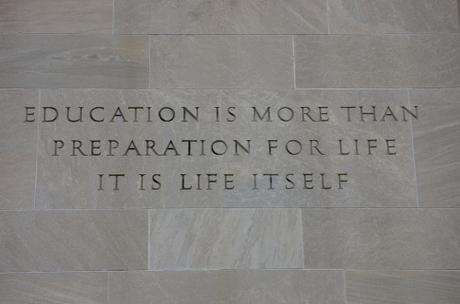By: Rhonda Nemri

"How come you're not working in your degree?" I was taken back by this question from a student pursuing a communication degree. I kindly answered it, however before I give you the answer, I will give you my background. For those who have been following this blog this is just a recap. I got my bachelor's degree in public relations in 2010 and my master's in communication in 2013. I taught several different communication courses, and then worked in healthcare for both international and domestic insurance members. I always wanted to be in higher education due to my experience in teaching at the university level, but felt it was difficult to obtain a full-time position doing just that. So I took on a job that wasn't communication or public relations specific, but it definitely needed someone who has a background in sending and receiving messages accurately and professional. So I learned quite a few things from working for an international insurance assistance company, that helped me teach better in the classroom, and how I approach students in the most complex situations. At some point during this employment, I did go back to teach part-time, while still obtaining a full-time position with this company.
I was dealing with health insurance members who traveled outside of the United States, and needed assistance with coordinating their benefits with the international network of hospitals and doctor's offices we dealt with. One of the most difficult aspects was getting the international provider's to trust that we would be paying them for the patients' healthcare services. Also, getting the patient/member to trust us that we will help them when in dire need of healthcare. Whether it be cancer treatments, triple bypass surgery, hip replacements, stitches, etc. I had to communicate information to these members, and help them understand what the next steps are to assist them through their procedures.
Studying public relations taught me how to deal with a crisis and adapt to different situations. I am not talking about how to do CPR, or using an AED on a person experiencing a heart attack. I am talking about having a plan in regards to how to approach a crisis situation. What information do we know, and how do we solve it? I am sure many of us have gone through personal crisis situations, and dealt with them accordingly. But knowing how to deal with someone else's crisis, is on a different level. Working outside of higher education gave me the opportunity to experience working with others, and how there are several pressures in the office that affect employees morale and growth. Knowing that I have worked in an office setting with different types of personalities, cultures, and those that have different work ethics, helped me create a better understanding for my students in the classroom. How can I teach workplace communication, or defensive communication if I have not even experienced it myself in the workplace? Learning communication theories is one thing, but actually experiencing it is another. My education and work experience meshing together fueled me in the classroom, and allowed me to lecture on my personal experience, rather than just textbook concepts. My work experience, were used as some of the best examples in the classroom.
Currently I am employed as an Academic Advisor for the Communication and Creative arts department. My job requires me to communicate with my students all year, whether it be spring, summer, or fall semester. I review, analyze, and use assessment reports and retention data to assist in advising students. I take part in numerous outreach campaigns for gaining enrollment. I audit student's degrees to ensure they have the correct courses and credits to award them their degrees. I take part in department and college initiatives to help us grow. I advise students on different career paths and opportunities (internships, and job opportunities). I can go on and on about what I do, but I won't
So now that you know a little background in regards to my employment, I want to go ahead and answer the question my students asked me. "How come you're not working in your degree?" My answer to them was simple. "I am doing something with my degree". I explained to my student that getting a degree in communication does not limit you to one specific job. The study of communication is so broad, that you can end up in any industry. Whether it be law, education, health care, entertainment, business, etc. Every industry needs a communication specialist or department. Advising is not a communication title, however I am using my knowledge of writing, research, data analysis, public speaking, event planning, outreach, and networking skills to be able to do my job. All skills learned from working on my degrees. Given that I work for the communication department, this is an added plus as my experience within the program helps me give the most informational insight to my students. I was the student that was unsure, and didn't quite know where I fit in. This experience has helped me know the difficulties that students go through on a daily basis. Having communication and professional skills will always help you in any field that you are in. My degree has given me the skills to do my job.
My healthcare background has also given me the skills needed to multitask different people's issues, and still resolve their problems within a timely manner. I am not dealing with individuals health care issues, but more so students college and career plans. When you deal with people, then you are in the customer service industry. Whether you are a faculty member, advisor, or working in enrollment services, you are constantly figuring ways to retain students. My student may have not been educated on the different careers that one may have with communication, but I can proudly say that I am working in my degree. One of the most essential parts of my job is to inform, and educate students on opportunities, and different ways to perceive their education. This is so similar to teaching, but in a different capacity. Some may get the perfect job out of college, while others have to work up the ladder to get where they want to be. Do not be discouraged if you are a recent college graduate, and haven't found anything just yet. Always find ways to grow, and keep learning. Starting at entry level can get you to that executive or director level. If you ever find that the degree you received isn't what you really want to do, then do not stop searching for ways to change the direction. Whether it be going back to school, or getting a certificate. You have to start somewhere.

